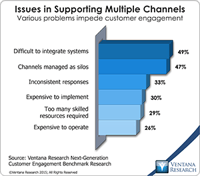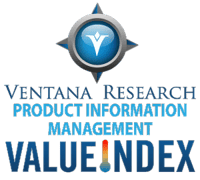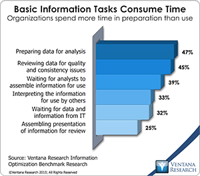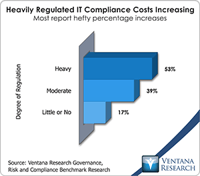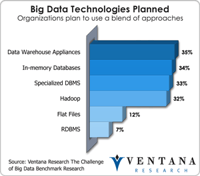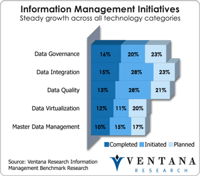Stibo Systems has been providing product information management (PIM) software for decades. Its work has helped many organizations worldwide take control of their product information by developing a master definition that can be published acrossmany channels from Web to digital to print. We recognized its work with customers Delta Faucet and Masco Corp. in our 2015 Ventana Research Leadership Award in Information Management. In 2014 Stibo Systems customer Brady Corp. won a similar award for...
Read More
Topics:
Big Data,
Master Data Management,
MDM,
Operational Performance Management (OPM),
PIM,
Stibo Systems,
Cloud Computing,
Business Performance Management (BPM),
Customer Performance Management (CPM),
Financial Performance Management (FPM),
Information Management (IM),
Information Optimization,
Product Information Management,
Sales Performance Management (SPM),
Supply Chain Performance Management (SCPM)
This has been a dramatic year for Informatica, a major provider of data integration software. In August it was acquired and taken private by Permira funds and Canada Pension Plan Investment Board for about US$5.3 billion. This change was accompanied by shifts in its management. CEO Sohaib Abbasi became chairman and now has left, and many executives were replaced while Anil Chakravathy became CEO from being the Chief Product Officer. The new owners appear to have shifted the company’s strategic...
Read More
Topics:
Big Data,
Data Quality,
Master Data Management,
MDM,
Operational Performance Management (OPM),
Cloud Computing,
Data Integration,
Data Management,
Data Preparation,
Governance, Risk & Compliance (GRC),
Informatica,
Uncategorized,
Business Performance Management (BPM),
Information Management (IM),
Information Optimization,
Risk & Compliance (GRC)
Ventana Research defines product information management (PIM) as the practice of using information, applications and other technology to effectively support product-related processes across the customer, commerce and supply chain. As organizations increase the number and diversity of products and services they offer to customers and partners, they increasingly need to address limitations in the ways they manage and distribute product information, including related attributes and content that...
Read More
Topics:
Big Data,
Master Data Management,
Governance,
Marketing,
Operational Performance Management (OPM),
CIO,
Business Performance Management (BPM),
Financial Performance Management (FPM),
Information Management (IM),
Information Optimization,
Product Information Management,
Sales Performance Management (SPM),
Supply Chain Performance Management (SCPM)
The importance of product information management (PIM) has become clear in recent years and especially as it relates to master data management. As I recently wrote handling this business process effectively and using capable software should be priorities for any organization in marketing and selling its products and services but also interconnecting the distributed supply chain. Our research on product information management can help organizations save time and resources in efforts to ensure...
Read More
Topics:
Big Data,
Master Data Management,
Enterworks,
Operational Performance Management (OPM),
Stibo Systems,
Webon,
CIO,
IBM,
Informatica,
Oracle,
Business Performance Management (BPM),
Financial Performance Management (FPM),
Information Management (IM),
Information Optimization,
Product Information Management,
Riversand,
Sales Performance Management (SPM),
Supply Chain Performance Management (SCPM)
Organizations today create and collect data at ever faster rates, and this introduces challenges in ensuring that data is not just managed but used in a consistent manner for a range of operational and analytic tasks. This is made more difficult by new data sources whose definitions vary from standard and widely used formats. Making all information available and consistent is essential to support business processes and decision-making. A key technology tool for this effort is master data...
Read More
Topics:
Big Data,
Data Quality,
Master Data Management,
Social Media,
Golden Records.,
MDM,
Operational Performance Management (OPM),
Business Analytics,
Cloud Computing,
Data Management,
Business Performance Management (BPM),
Customer Performance Management (CPM),
Financial Performance Management (FPM),
Information Applications (IA),
Information Management (IM),
Sales Performance Management (SPM),
Supply Chain Performance Management (SCPM),
Workforce Performance Management (WPM)
At the Informatica World 2014 conference, the company known for its data integration software unveiled the Intelligent Data Platform. In the last three years Informatica has expanded beyond data integration and now has a broad software portfolio that facilitates information management within the enterprise and through cloud computing. The Intelligent Data Platform forms a framework for its portfolio. This expression of broad potential is important for Informatica, which has been slow to...
Read More
Topics:
Big Data,
Master Data Management,
Operational Performance Management (OPM),
Business Analytics,
Business Intelligence,
CIO,
Cloud Computing,
Data Integration,
Data Management,
Informatica,
Business Performance Management (BPM),
Customer Performance Management (CPM),
Financial Performance Management (FPM),
Information Applications (IA),
Information Management (IM),
Information Optimization,
Product Information Management,
Sales Performance Management (SPM),
Supply Chain Performance Management (SCPM),
Workforce Performance Management (WPM),
application
Information management is important to every line of business that seeks to improve its business processes and decision-making. In response to pressure from those departments, CIOs and IT organizations must examine whether they have focused enough on the I for information and not just the T for technology, and if they have not, commit to taking this responsibility more seriously than in the past. Informatica is one vendor that realizes the potential of its information beyond just data...
Read More
Topics:
Data Quality,
Master Data Management,
Operational Performance Management (OPM),
PowerCenter,
Analytics,
Business Analytics,
CIO,
Cloud Computing,
Data Integration,
Information Applications,
Information Management,
Business Performance Management (BPM),
Information Applications (IA),
Information Management (IM),
Information Optimization,
Vibe
I recently attended the annual Informatica analyst summit to get the latest on that company’s strategy and plans. The data integration provider offers a portfolio of information management software that supports today’s big data and information optimization needs. Informatica is busy making changes in its presentation to the market and its marketing and sales efforts. New executives, including new CMO Marge Breya, are working to communicate what is possible with Informatica’s product portfolio,...
Read More
Topics:
Big Data,
Data Quality,
Master Data Management,
Salesforce.com,
MDM,
Business Analytics,
Business Intelligence,
Cloud Computing,
Data Governance,
Data Integration,
Data Management,
Governance, Risk & Compliance (GRC),
Informatica,
Information Management,
Location Intelligence,
Operational Intelligence,
CEP,
Informatica Cloud,
Information Management (IM),
IT Performance Management (ITPM),
Strata+Hadoop
Big data involves interplay between different data management approaches and business intelligence and operational systems, which makes it imperative that all sources of business data be integrated efficiently and that organizations be able to easily adapt to new data types and sources. Our recent big data benchmark research confirmed that big data storagetechnologies continue to follow many approaches, including appliances, Hadoop, and in-memory and specialized DBMSes. With the variety,...
Read More
Topics:
Big Data,
Data Quality,
Master Data Management,
Business Analytics,
Cloud Computing,
Data Integration,
Information Management,
Operational Intelligence,
Information Applications (IA),
Information Management (IM)
Managing data efficiently across the enterprise continues to be a large challenge for both business units and IT. Organizations need data supplied in a consistent format and timely manner to help manage their activities and processes, but some do not look beyond conventional approaches to improvement. Today’s large volumes of data make it more difficult to understand the relationships among data and the role of location-related data. Our 2012 benchmark research on information management found...
Read More
Topics:
Big Data,
Master Data Management,
Social Media,
MDM,
Operational Performance Management (OPM),
Business Analytics,
Business Intelligence,
Cloud Computing,
Data Governance,
Information Management,
Location Intelligence,
Customer Performance Management (CPM),
DG,
Information Applications (IA),
Information Management (IM),
IT Performance Management (ITPM),
Sales Performance Management (SPM)



